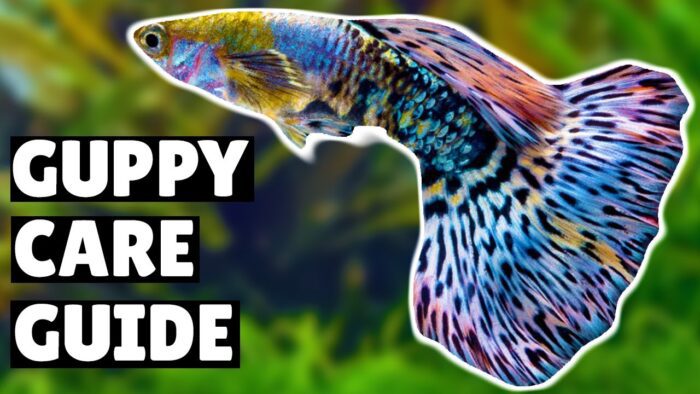Guppies are popular freshwater aquarium fish that are easy to care for. With their bright colors and active behaviors, guppies can be fun and rewarding pets. In this article we talk about guppy health care with simple tips for happy fish.
Table of Contents
Water Quality
Water quality is extremely important for guppy health. Test and monitor the water regularly to maintain ideal conditions.
Temperature
Guppies prefer water temperatures between 74-82°F. Use an aquarium heater and thermometer to keep the temperature consistent. Rapid temperature fluctuations can stress fish.
pH Level
Guppies do best in slightly alkaline water with a pH between 7.0-8.0. Use pH test kits to check levels. Adding materials like crushed coral can help buffer pH.
Hardness
Moderate water hardness between 150-300 ppm is recommended. Too soft or hard water can negatively impact osmoregulation and nutrient absorption.
Ammonia and Nitrites
These waste chemicals should always measure at 0 ppm. Even low levels are highly toxic. Use water treatments to detoxify the water if levels rise.
Nitrates
Keep nitrates under 40 ppm by performing partial water changes. High nitrates can cause disease and reduce growth rates.
Filtration
A good filtration system helps remove waste, maintain water flow, and oxygenate the water. Power filters provide the best filtration for guppy tanks.
Diet
Guppies are omnivorous and will eat both plant and animal materials. Feed them 2-3 small meals daily.
Flake Foods
Select a high quality flake with at least 30% protein. Feed several small pinches per meal.
Live/Frozen Foods
Offer treats like brine shrimp, daphnia, or bloodworms 1-2 times a week. This varies their diet.
Vegetables
Blanched veggies like zucchini or spinach help enhance nutrition. Just remove any uneaten portions to avoid spoilage.
Supplements
Soak flake foods in vitamin drops or gut loading formulas 1-2 times a week. This fortifies their nutrient intake.
Avoid overfeeding, as excess food pollutes the tank water.
Tank Setup
Habitat
In nature, guppies live in slow moving freshwater streams, ponds, and pools. Recreate this peaceful environment at home.
Size
House guppies in at least a 10 gallon aquarium. This allows ample room to explore and swim. Bigger is always better.
Current
Guppies prefer minimal water movement. Position filters and powerheads to create a gentle current.
Plants
Include several live or silk plants. This resembles their natural habitat and provides security.
Hiding Spots
Add decor like rock caves, driftwood, and aquarium ornaments. These offer places to retreat and help reduce stress.
Substrate
Use a smooth substrate. Gravel could damage delicate fins if guppies sift through it. Sand is an excellent choice.
Tank Mates
Peaceful Species
Good tank mates include other small, peaceful fish like neon tetras, white cloud minnows, corydoras catfish, and dwarf gouramis. Introduce any new fish gradually.
Avoid Fin Nippers
Steer clear of aggressive species like tiger barbs, serpae tetras, and convict cichlids. These may nip at flowing guppy fins.
Male Ratio
House only 1 male guppy per 2-3 females. Males will pester females excessively during mating attempts otherwise.
Health Care
Observe Fish
Get to know your fish’s normal appearance and behaviors. Watch for any signs of disease like spots, ragged fins, bloating, or lethargy. Catch problems early.
Quarantine
Keep a separate 5-10 gallon tank for quarantining new guppies before adding them to your main tank. This prevents introducing contagious diseases.
Medicate Properly
Use aquarium salt, anti-parasitic, antibacterial, or antifungal medications as needed. Follow all product instructions carefully.
Vary Diet
Feed a high quality, varied diet. This helps boost immune function and prevent nutritional deficiencies that can cause health issues.
Test Water
Check water parameters frequently. Poor water quality is the root of most fish disease outbreaks.
Partial Water Changes
Perform 25% water changes weekly and siphon the substrate to remove waste. Adding clean, fresh water helps refresh the tank.
By starting with healthy guppies and maintaining proper water conditions, diet, tank setup, tank mates, and care routine, your guppies should have many years of good health ahead! Let their lively activity and flashes of color brighten your home. With a little effort, owning guppies can be a fun, rewarding adventure. I sincerely hope you find this “Guppy Health Care- Simple Tips for Happy Fish” article helpful.

Lena Whitmore is the lead writer at FishClans.com, bringing over 10 years of fishkeeping expertise and a master’s degree in Marine Biology to the site. Her extensive knowledge and practical tips have established her as a respected authority in the aquarist community. Lena’s work has appeared in leading publications and she frequently speaks at industry events.
Connect with Lena and FishClans on Facebook, Pinterest, and Instagram.

